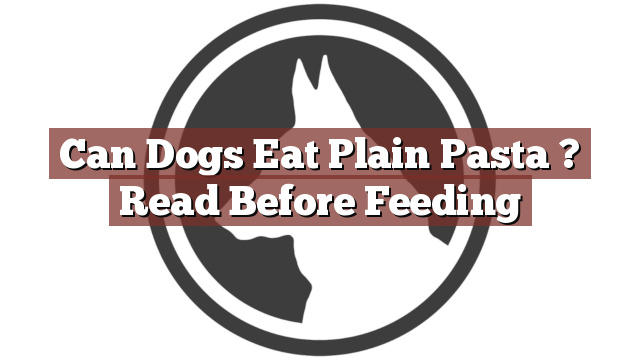Understanding Your Dog’s Dietary Needs
Just like humans, dogs have specific dietary needs that must be met to ensure their overall health and well-being. While dogs primarily require a diet rich in animal protein, they can also benefit from certain carbohydrates. However, it is important to note that not all human foods are safe for dogs to consume, as their digestive systems are different from ours. Before introducing any new food into your dog’s diet, it is crucial to do thorough research and consult with your veterinarian to ensure its safety.
Can Dogs Eat Plain Pasta? Read Before Feeding
Can dogs eat plain pasta? Yes, dogs can eat plain pasta in moderation. Plain, cooked pasta is generally safe for dogs to consume, but it should only be given as an occasional treat and not as a staple in their diet. Pasta provides carbohydrates that can be a good source of energy for dogs, but it lacks essential nutrients that are vital for their overall health.
When feeding plain pasta to your dog, it is important to avoid adding any seasonings, sauces, or toppings. These additions, such as garlic or onions, can be toxic to dogs. Additionally, pasta should never replace a balanced and nutritionally complete dog food, as it does not provide all the necessary nutrients that dogs need to thrive.
Pros and Cons of Feeding Pasta to Dogs
Feeding plain pasta to your dog can have both advantages and disadvantages. One of the benefits of giving your dog plain pasta is that it can provide them with a quick source of energy. Carbohydrates are converted into glucose, which fuels the body and helps maintain energy levels. However, it is essential to keep in mind that dogs primarily need animal protein in their diet, so pasta should only be given sparingly.
On the other hand, there are some potential drawbacks to feeding pasta to dogs. As mentioned earlier, pasta lacks essential nutrients, such as vitamins and minerals, that are crucial for a dog’s overall health. Therefore, relying on pasta as a significant part of your dog’s diet can lead to nutritional deficiencies over time. Additionally, consuming excessive amounts of pasta can cause weight gain and digestive issues in dogs, just as it can in humans.
In Conclusion: Consider Your Dog’s Health and Moderation
Can a dog eat plain pasta? Yes, but in moderation. While plain pasta can be safe for dogs to consume, it should only be given as an occasional treat and not as a substitute for a balanced and nutritious diet. It is crucial to prioritize your dog’s overall health and ensure they are receiving all the necessary nutrients from their regular dog food. If you have any concerns or questions about your dog’s diet, it is always best to consult with your veterinarian for professional advice tailored to your pet’s specific needs. Remember, the key to a healthy and happy dog is a well-rounded and balanced diet.
Thank you for taking the time to read through our exploration of [page_title]. As every dog lover knows, our furry friends have unique dietary needs and responses, often varying from one canine to another. This is why it's paramount to approach any changes in their diet with caution and knowledge.
Before introducing any new treats or making alterations to your dog's diet based on our insights, it's crucial to consult with a veterinarian about [page_title]. Their expertise ensures that the choices you make are well-suited to your particular pet's health and well-being.
Even seemingly harmless foods can sometimes lead to allergic reactions or digestive issues, which is why monitoring your dog after introducing any new food item is essential.
The content provided here on [page_title] is crafted with care, thorough research, and a genuine love for dogs. Nevertheless, it serves as a general guideline and should not be considered a substitute for professional veterinary advice.
Always prioritize the expert insights of your veterinarian, and remember that the health and happiness of your furry companion come first.
May your journey with your pet continue to be filled with joy, love, and safe culinary adventures. Happy reading, and even happier snacking for your canine friend!

